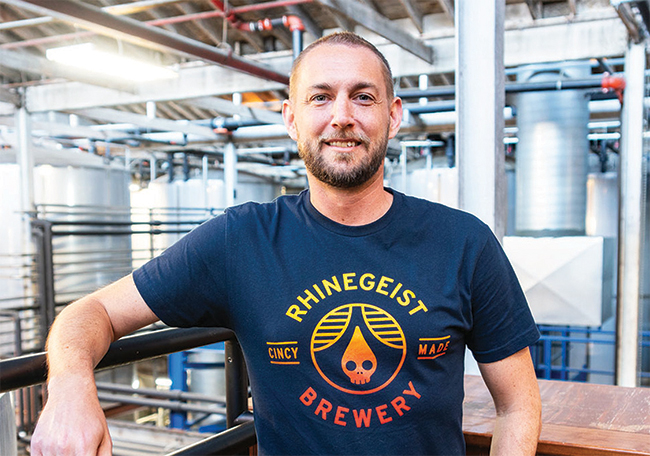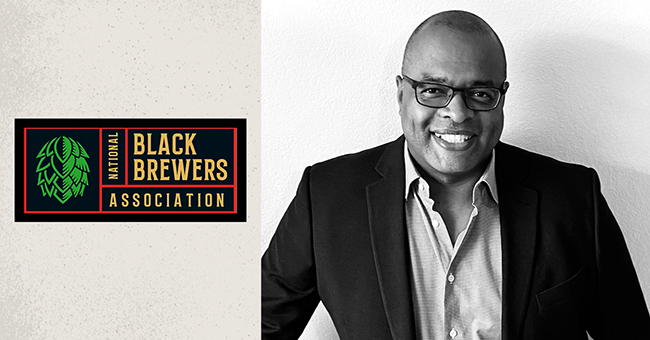Brewscape: The Latest Craft Beer Brand News
Craft Brewers Conference General Session: Slow to No Growth Craft’s ‘New Normal’
Brewers Association (BA) president and CEO Bob Pease shared a message of optimism during the Craft Brewers Conference (CBC) in Nashville.
While craft brewers continue to deal with increased costs, supply chain disruptions, labor shortages and more, Pease and the BA still “firmly believe that craft’s best days are ahead,” Pease said in his opening remarks during the conference’s general session on May 8.
To reach those best days, Pease encouraged members to collaborate both in innovation and in problem solving. That message was echoed at the close of the session during a panel with Pease and fellow trade group leaders Brian Crawford, president and CEO of the Beer Institute (BI) and Craig Purser, president and CEO of the National Beer Wholesalers Association (NBWA).
“We know when a consumer has an occasion … they have a choice, and we’ve got to be more relevant,” Purser said. “[The solution] I think it’s focus, it is execution, but I also think it is everybody collectively coming together and deciding we’re going to stop that trend of category decline.”
“Short term, there’s no doubt that hard liquor has been taking market share from us and part of it has been that beer has been somewhat asleep at the switch,” Crawford said. “We’ve been focusing inward and not watching what’s happening around us.
“We need to make sure that we’re aligned in fighting back and fighting for beer,” he continued. “The greatest opportunity is the fact that the three of us are on stage together and we’re singing off the same song sheet song sheet, and we’re aligned.”
While Pease and his compatriots preached for a positive craft beer future, BA chief economist Bart Watson gave craft brewers a bit of a wake-up call during his CBC keynote address. In it, he shared final numbers from the BA’s annual production survey, which indicate a “new normal” of slow to no growth for craft breweries.
Volume for BA-defined craft breweries in 2022 was flat year-over-year (YoY). The flat growth rate in a more mature marketplace – on the heels of two disrupted years due to the COVID-19 pandemic – has left craft brewers in a space where they need to innovate and reach new consumers to find future growth.
Over the last six years (2017-2022), Watson noted that the average annual growth rate over that period is +1.2%, a stark decline from growth rates in the previous decade.
“Those years of double-digit growth are clearly well in the rearview mirror,” he said. “And unless something changes, I don’t think we’re going to see them again anytime soon.”
Watson also added the caveat that “zero growth doesn’t mean no change,” and the industry is evolving with the convergence of non-alcoholic beverages with alcoholic beverages.
“All of the changes going on around us and beverage alcohol are one reason the craft industry growth is so slow, so we shouldn’t take this 0% number to mean that the industry is static,” he said.
Watson stressed multiple times that the things that got craft beer to the level it is now, with more than 9,500 breweries and over a decade of record growth, are not the things that will allow the segment to regain growth and momentum.
“The ideas that have gotten craft where it is were wonderful, they were ingenious, they changed the beverage alcohol world,” he said. “But that’s not the same thing as saying the ideas that got us here are the ones that are going to take us to the next level. We’re going to need new ways of thinking.
“I wish I could stand here and tell you that I have all the answers – that I know where the new occasions are, the new customers – but frankly, I don’t,” he continued. “What I do know is the first two-thirds of this talk showed us that if we continue to do things the same way we’ve been doing them, that’s the recipe for slow growth and stagnation.”
Watson’s suggestions:
Expand where beer is sold, taking advantage of growing channels such as c-stores and reinvigorating “old channels” such as the on-premise;
Create new beer occasions – like non-alcoholic beer has – and try to take back the occasions the spirits industry has taken over the last decade, including sporting events;
Think differently about style trends, focusing more on what beer styles a craft brewery can make best and uniquely, rather than tying innovation to what style is growing the most in scan data – data that is often skewed by one or two companies anyway;
And find new consumers, including women and people of color, who are the largest demographics growing in beverage-alcohol and severely underindex in craft.
Founders Hit With Second Racial Discrimination Lawsuit
On the same day Founders Brewing announced it had permanently closed its Detroit location, a former employee filed a lawsuit against the company claiming the taproom’s work environment was “so objectively racially hostile that she had no choice but to resign.”
Plaintiff Naeemah Dillard filed a lawsuit in U.S. District Court in the Eastern District of Michigan Southern Division on May 1. On her behalf, attorney Jack Schulz detailed months of discrimination, unfair treatment and retaliation against Dillard in the complaint.
Dillard resigned April 23 and filed racial discrimination and retaliation charges with the Equal Employment Opportunity Commision (EEOC) on April 24, in which she alleged Founders violated Title VII of the Civil Rights Act of 1964.
Her complaint is the second high-profile lawsuit against Founders in which a Black employee alleged they were discriminated against at the Detroit taproom because of their race. Mahou San Miguel-owned Founders settled with Tracy Evans in his 2019 racial discrimination lawsuit, and closed the taproom for several months so it could handle “some challenges.”
“Throughout Ms. Dillard’s time as a manager at Founders’ Detroit Tap Room, she [was] utilized merely for the optics of having a Black manager while being treated completely different than her white counterparts,” Schulz wrote in a statement.
Dillard, a Black woman, was promoted to part-time taproom manager in July 2022 after joining the taproom staff as a server in June 2021. She was one of several managers, the rest of whom were white, and “was treated much differently than her Caucasian counterparts” “from the start,” according to the complaint.
Also on May 1, Founders announced it had permanently shuttered the Detroit taproom, which “has not been immune to the struggle to regain foot traffic after temporary COVID closure that have impacted restaurants and bars across the nation.” Founders added it was “working diligently to find new positions within the company for the [38] employees impacted by this closure.”
A press release issued to the media and social media posts announcing the closure made no mention of Dillard’s lawsuit, and Founders has since disabled comments on its Facebook and Instagram posts about the closure.
In a statement, Founders said it was “unaware” of Dillard’s complaint when it announced the taproom’s closing.
“We announced the closing to all of our Detroit staff on Monday morning, and did not learn about the lawsuit filed against Founders until that evening when a reporter contacted us,” the company said.
Since settling with Evans in 2019, the company has “instituted mandatory bias, discrimination and harassment training throughout our organization,” it said. “We have reexamined our policies and enacted new policies, along with implementing new procedures for the reporting of workplace concerns.”
New Interim CEO to Lead ‘Next Phase of Rhinegeist’
Rhinegeist Brewery’s April was a month of “a lot of disruption” but also “minimal anxiety and the sense of calm,” following the appointment of chief commercial officer Adam Bankovich to interim CEO, Rhinegeist co-founder Bryant Goulding told Brewbound.
Bankovich, whose new title was announced April 26, takes over for Michael Parks, who served as CEO for two years. Parks was the Cincinnati, Ohio-based brewery’s first CEO after Goulding and co-founder Bob Bonder took a step back from the company’s day-to-day operations and began transitioning it to employee ownership.
“We hired a CEO recognizing that us founders weren’t the best managers,” Goulding said. “To step aside creates the space for someone to come in and manage the vision, the strategy to get there, develop leaders and deliver on all of the awesome potential that exists here at the brewery.
“For the next phase of Rhinegeist, we need to create a space for our leaders to build strategic direction, so that it is actually running itself and we’re not just dictating strategy, and then execution happens,” he continued. “That’s us still leading, but from afar, which is suboptimal.”
Bankovich joined Rhinegeist as CCO in October 2022, following a nine-year stint at Stone Brewing. While he carries the “interim” tag at the moment, the situation is more of a “living interview,” with Rhinegeist planning to explore outside options for CEO, but no intention to “definitely” find someone new, Goulding said.
“We’ll know when we know and then react accordingly,” he added.
Rhingheist is handling the CEO transition “a bit differently” than last time, “recognizing that what we want as a CEO is someone who is open and curious and empathetic and really human oriented,” Goulding said. Bankovich is someone who embodies “that spirit,” he added.
Employees were made aware of the transition on Monday, April 24, via email. Video interviews with different departments and leadership were held the following two days to share questions, department challenges and more, Goulding said.
The intent is to be completely transparent with the Rhinegeist team on the vision for the decade-old company and the changes being made to achieve that vision.
“We’re a much larger company than we were 10 years ago, stating the obvious, so some of the things really do need to have a little more rigor and discipline behind them,” Bankovich said. “That being said, it’s always been important to me to add a level of transparency and understanding so people understand the why behind what we’re doing, so that’s been my focus over the past six months.
“This complex, diverse company that we have here, everybody needs to take a pause and know that what we did for the past 10 years isn’t what’s going to take us to the next 10, and it’s worth re-evaluating things and asking questions and figuring out what else we can do together,” he continued.
Goulding and Bonder founded Rhinegeist with the intent to stay away from the “styrofoam-tasting speak” and culture of the corporate world. That goal led to the creation of “geistiness,” a word to describe the Rhinegeist spirit of embracing individuality, ambition and creativity. As craft beer tackles a particularly challenging time as a segment, Rhinegeist is looking into how it can evolve and grow its business, while still maintaining that culture.
“There is a geistiness that will always be a part of this place, and then there’s a mature stance on how do we really give our people a framework to excel so that we keep the culture of excellence,” Goulding said. “Because geistiness is cute, but excellence is what has brought us here, and what will get us there. And better defining there, and how we invest and resource in getting there, is what I’m excited about.”
Rhinegeist was the No. 23 largest Brewers Association-defined craft brewery by volume in 2022, jumping five spots after ranking No. 28 in 2021. The brewery produced 103,561 barrels of beer in 2021 – the most recent production year available from the BA – increasing production +6% year-over-year.
Listen to the full interview with Goulding and Bankovich on the Brewbound Podcast. The episode is available on Brewbound.com and on popular podcast platforms, including iTunes, Google Play, Stitcher and Spotify.
Beverage Veteran Kevin Asato Tapped to Lead National Black Brewers Association
The National Black Brewers Association (NB2A) announced its launch in May as the Brewers Association’s (BA) annual Craft Brewers Conference (CBC) kicked off in Nashville, Tennessee.
NB2A is a “first-of-its-kind non-profit organization” that aims to promote the Black brewing community; increase Black participation at all levels of brewery employment, “especially ownership and brewmasters;” develop and advocate for policies to bolster the community; and provide “historical context and legacy surrounding African American influence on brewing in the U.S.,” according to a press release.
The organization has tapped beverage industry veteran Kevin Asato as its first executive director. Asato’s career includes stints at PepsiCo, the former Dr Pepper Snapple Group, Bacardi and Republic National Distributing Company.
Asato made his first public appearance in the role in Nashville during Brewbound’s Brew Talks meetup.
“We want to be the most trusted and respected and impactful organization for Black brewers of America,” he said at Brew Talks. “We’re going to highlight the history and understanding of Black brewers, and from that history our mission is going to be driven towards, quite frankly, addressing the fact that only 1% of ownership is in the Black and African American communities, so we’re going to look to right that and increase that and be a little bit more rep of the demographics of the U.S.”
The NB2A’s inaugural year officers, as appointed by its board of directors, include:
- President Kevin Johnson, Oak Park Brewing;
- First vice president Garrett Oliver, Brooklyn Brewery;
- Second vice president Dr. J. Jackson-Beckham, Crafted for All;
- Treasurer Marcus Baskerville, Weathered Souls Brewing;
- Secretary Celeste Beatty, Harlem Brewing.
In addition to the aforementioned officers, the NB2A board of directors includes:
- Clarence Boston, Hippin’ Hops Brewing, Atlanta;
- Alisa Bowens-Mercado, Rhythm Brewing, New Haven, Connecticut;
- Denise Ford-Sawadogo, Montclair Brewing, Montclair, New Jersey;
- Rodney Hines, Métier Brewing, Seattle;
- Aaron Hosé, filmmaker;
- Teo Hunter, Crowns & Hops Brewing, Inglewood, California;
- Khris Johnson, Green Bench Brewing, St. Petersburg, Florida;
- Jon Renthrope, Cajun Fire Brewing, New Orleans;
- Dennis Malcolm Byron, Ale Sharpton beer media and content, Atlanta.
Asato was joined on the Brew Talks stage by Beatty and Harris. The full discussion is available to watch on Brewbound.com.


Receive your free magazine!
Join thousands of other food and beverage professionals who utilize BevNET Magazine to stay up-to-date on current trends and news within the food and beverage world.
Receive your free copy of the magazine 6x per year in digital or print and utilize insights on consumer behavior, brand growth, category volume, and trend forecasting.
Subscribe


